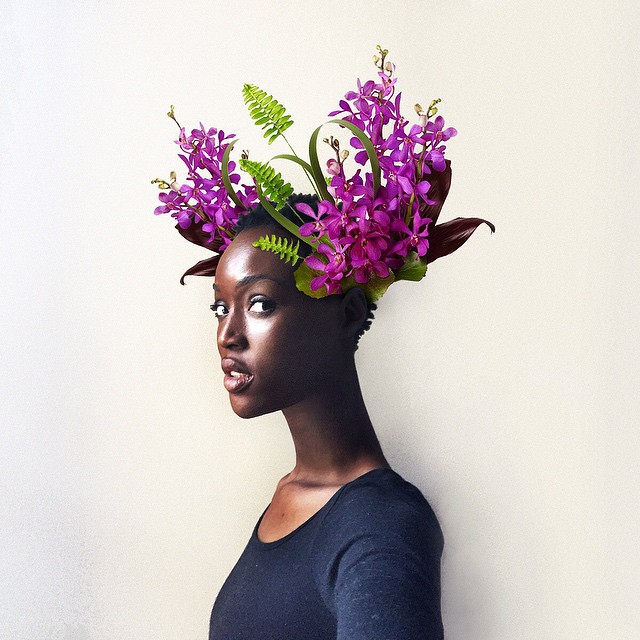Ivorian designer Loza Maléombho’s #AlienEdits selfie series
The #AlienEdits series seems to come as a form of resistance to negative social projections regarding race, gender, sexuality and culture.

#AlienEdits
In her discerning 1977 book On Photography, Susan Sontag declared: “Photography has become almost as widely practiced an amusement as sex or dancing – which means that, like every mass art form, photography is not practiced by most people as an art.” Indeed with the proliferation of powerful cameras and smartphones, most anyone can access the tools to take a picture. Now, what qualities allow a photograph to enter into the realm of art may be highly subjective, but what is clear is that within the medium of photography, some images clearly have greater social resonance than others.
This is especially true in the world of instagram where there are an estimated 70 million photos uploaded to the social image sharing network daily. Many of the images merely serve as evidence of the users’ daily lives, but a few imagemakers go beyond this memorialization of mundanity by sharing works that seek to affect social consciousness.
Ivoirian designer Loza Maléombho has struck such a social chord by developing an image series on instagram called #AlienEdits, which fuses cultural significance with aesthetic quality in the ubiquitous form of the selfie. The #AlienEdits series was initially developed as an uplifting response to the alienation, discrimination and misrepresentation black and brown people frequently experience at the hands of oppressive institutions, though it has since evolved to feature new faces and cultural themes.
By focusing largely on the selfie, Loza transforms herself into a work of art and becomes both the observer and the observed, thereby placing the power of representation in her own hands. This determination of her own likeness is an act of reclaiming her image and she does so with a grace that makes the viewer wonder who really is the alien after all. And in doing so, the normally self-indulgent selfie is given a greater purpose.
We spoke to Loza about the inspiration for her visual quotations of culture, instagram as gallery and the evolution of the #AlienEdits series.
The #AlienEdits series seems to come as a form of resistance to negative social projections regarding race, gender, sexuality, culture etc. Can you speak to what sparked the series?
“Alien Edits” are socially conscious selfies expressed through style, pride, grace, and cultural awareness and against racial, class, cultural, religious and sexuality stereotypes, all of which cause a state of alienation on its victims.
The recent US judiciary system’s discriminative decisions against African Americans such as in the case of Michael Brown in Ferguson as well as the lack of sensitivity from African governments towards human rights in the case of the 200 girls being kidnapped by Boko Haram in Nigeria, are most responsible for the series. I think the spark happened after the grand jury found Darren Wilson not guilty in the case of Mike Brown. The decision carried emotions of deep despair which I think were felt amongst African Americans and also Africans of the diaspora. While I empathised with sadness and anger on that day, I also felt deeply devalued, even alienated in some way. I needed to quickly eradicate those feelings for me and anyone like me by nurturing the exact opposite: Pride and self-validation. Ever since then “Alien Edits” became a way to respond to current events, celebrate cultural diversities and traditions, and communicate with people of my generation.
Is each image a version of yourself or an imagined persona?
Sometimes it is a version of me, other times it is who I aspire to be. For instance “Helmet of Grace” represents a persona who is simultaneously protected by and leading with “Grace” when challenged by feelings of anger or an impulsion to speak without control. The latter is a trait of personality I often struggle with. When I am confronted with injustice I tend to let anger speak louder instead of thinking first. This is something I’d like to change. On the other hand, the image “Own Yours” is a projection of myself as an artist owning and maturing in a world I have created.
How does the public interface of instagram fare as a gallery wall?
We are a generation stigmatised as “Selfie-obsessed,” which in itself calls for a narcissistic stereotype. I intended to defy that notion by spreading socially conscious messages and stimulating a paradox, while doing so through the selfie itself. Since I am taking selfies it only made sense to display them via Instagram to begin with. It is a direct window to the audience I am talking to who can relate to both content and medium. The message couldn’t spread any easier.
How do you see the series evolving with new faces entering the frame?
I recently started introducing young influential Africans of the diaspora to the series because I’d like to extend the conversation to a wider audience. I am interested in what everyone is saying and I am open to help communicate these emotions through the series. I am looking to empower victims of stereotypes and discrimination with these positive messages.



















